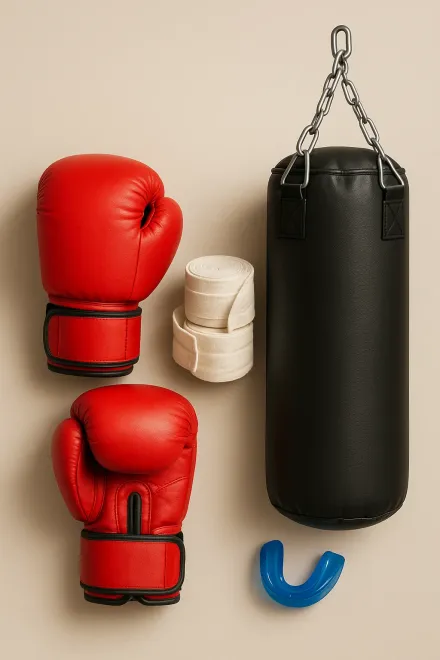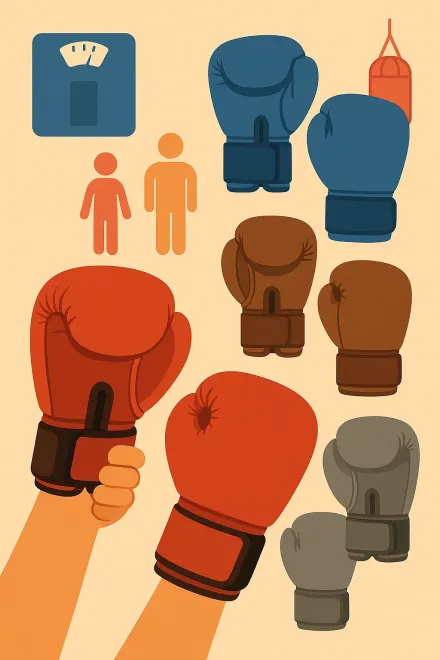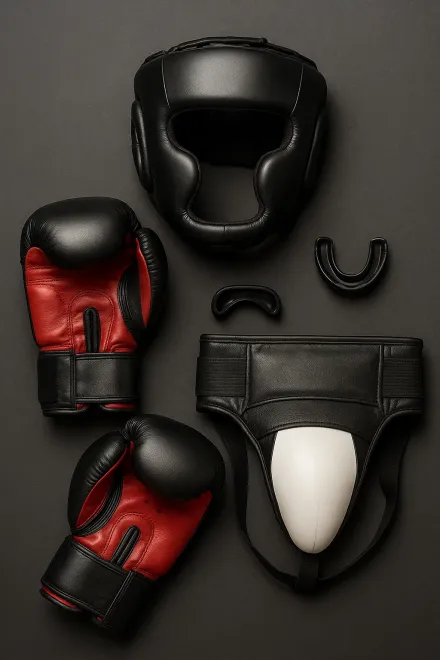Boxing Accessories
Boxing is not only a combat sport, it is also a discipline that requires technique, consistency, and above all, choosing the right accessories. Having the correct boxing accessories not only improves performance but also ensures safety during every training session and fight. From gloves to the most specific protective gear, each item plays an essential role. In this guide you will find a detailed description of the most important boxing accessories, tips on how to choose them, and recommendations on how to integrate them into your training routines. Whether you are a beginner or advanced, this information will be very useful to equip yourself in the best way.
See boxing accessories on Amazon
Key boxing accessories you should not miss
When practicing boxing, it is essential to have the right accessories to ensure safe, effective, and professional training. Basic accessories include boxing gloves, hand wraps, punching bags, and mouthguards. Each of these items serves a different purpose and is essential for both beginners and advanced boxers.
Boxing gloves are the most recognizable accessory and protect the hands and wrists while cushioning impacts to prevent injuries. Wraps, on the other hand, are essential for supporting finger joints and preventing sprains. The punching bag is the main tool for training punches, endurance, and accuracy. And of course, the mouthguard is indispensable to protect teeth and gums during sparring or fights.
There are also additional accessories such as headgear, focus mitts for training with a coach, jump ropes, and striking pads. All of these contribute to a complete and balanced training.
How to choose the right boxing gloves
Gloves are one of the most important accessories in boxing, and choosing the right ones will make a huge difference in your performance and safety. Gloves should match your weight, experience level, and type of training. Not all gloves are the same, and there are different types depending on their use.
- Training gloves: designed for bag or mitt work. They are usually more durable and well-padded.
- Sparring gloves: designed for partner training, with extra protection to avoid injuries.
- Competition gloves: lighter and adjusted to each federation's standards.
A key factor is glove weight, which is measured in ounces (oz). Beginners usually use 12 to 14 oz gloves, while advanced boxers go for 16 oz to train with greater protection. It is also crucial to consider the material: synthetic leather is cheaper, while genuine leather offers greater durability. Finally, check the closure system, which can be velcro or laces, depending on the comfort and support you need.


Essential protective gear for safe training
In addition to gloves, protective gear in boxing plays a vital role in preventing serious injuries. Boxing is a contact sport, and although the goal is to improve technique and fitness, safety must always be the priority.
- Mouthguard: prevents dental fractures, lip cuts, and reduces jaw impact.
- Headgear: especially useful in sparring, protects the head from direct impacts.
- Groin protectors: essential to protect the lower area during training or fights.
- Chest or body protectors: mainly used in technical training or amateur categories.
All of these items are designed to allow practitioners to train with more confidence and reduce risks. Investing in good protective gear is just as important as choosing quality gloves, since injury prevention is what allows a consistent and safe practice over time.
Complementary training accessories in boxing
Boxing is not limited to fighting. Physical and technical preparation requires multiple complementary accessories that help develop agility, endurance, and precision. These accessories are not mandatory, but they make a big difference in training quality.
The jump rope is one of the most classic and effective tools. It improves cardiovascular endurance, coordination, and footwork, all fundamental for any boxer. Another useful accessory is focus mitts, used with a trainer to work on precision, speed, and punch combinations.
Strike pads allow you to train arm strength and endurance, while the medicine ball helps strengthen the core and improve explosiveness. Resistance bands are also very useful for training strength and endurance in stabilizing muscles.
In specialized gyms, boxing machines and bags with impact sensors are also used to measure punch power and speed. For those who train at home, having a punching bag with stand, proper gloves, and a jump rope may be enough for a complete workout.
The choice of these accessories will depend on each practitioner's level and goals. If the focus is competitive, it is advisable to invest in more professional equipment. For those seeking fitness conditioning, some basic accessories will be enough.
Tips for buying and caring for your boxing accessories
Investing in quality boxing accessories is essential, but keeping them in good condition to extend their lifespan is just as important. Whether you train at home or in a gym, these tips will help you keep your gear in top shape.
- Boxing gloves: always use wraps when training, as they absorb sweat and prevent gloves from wearing out quickly. After each session, air them out to avoid bacteria and bad odors.
- Wraps: wash them frequently and have at least two pairs to alternate. Clean, well-fitted wraps are key for hand safety.
- Punching bags: check the filling and attachment regularly. If you train at home, make sure it is properly installed to prevent accidents.
- Mouthguards and headgear: clean them after each use with water and mild soap. Hygiene in these accessories is essential to prevent infections.
When buying, make sure to check reviews from other users and choose well-known boxing brands. The difference between a cheap accessory and a quality one can be seen in safety, durability, and comfort.
Finally, remember that accessories should match your level and goals. Equipping for home fitness training is not the same as for sparring in a professional gym. Plan your purchase according to your needs and take care of your gear to get the most out of it.
Frequently asked questions about boxing accessories
What accessories are essential to start boxing training?
The basic accessories to start with are boxing gloves, hand wraps, a mouthguard, and a punching bag if you train at home. These ensure protection and allow you to train safely. As you progress, you can add headgear, a jump rope, and focus mitts.
What weight boxing gloves should I choose?
Glove weight is measured in ounces (oz). Beginners usually use 12 to 14 oz gloves for general training. 16 oz gloves are ideal for sparring due to their extra padding. For competitions, the weight will depend on the federation's rules and the boxer's weight.
Is it necessary to wear wraps under the gloves?
Yes, wraps are essential. They provide support to hand joints, absorb sweat, and extend glove lifespan. Without wraps, the risk of sprains and knuckle fractures increases significantly.
What is the difference between training gloves and competition gloves?
Training gloves have more padding and are designed to withstand use on bags and mitts. Competition gloves are lighter and meet official standards, prioritizing speed and performance in fights. It is recommended to have both if you practice boxing seriously.
How can I keep my boxing gloves in good condition?
Always use wraps, air the gloves after each training session, and avoid storing them in closed places without ventilation. There are also special disinfectant sprays to eliminate bacteria and odors. With these care tips, gloves can last for years.
What additional protective gear is recommended in boxing?
In addition to the mouthguard and gloves, it is recommended to use headgear for sparring, a groin protector, and in some cases a chest protector. These accessories are essential for training safely, especially in practice fights.
Can I train boxing at home without a bag?
Yes, you can train without a bag using shadowboxing, jump rope, and focus mitts if you have a partner. However, a punching bag is highly recommended because it allows you to work on power, accuracy, and endurance in a more complete way.
